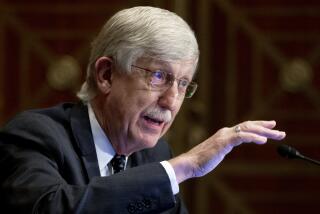IDEOLOGICAL STUDY OF PUBLIC TV IS POSTPONED
- Share via
The Corp. for Public Broadcasting has temporarily shelved a plan to spend $180,000 in federal funds to study the ideological slant of documentaries on public television.
The “content analysis,” first proposed in May, sparked a firestorm of criticism in the public broadcasting community and renewed a bitter political debate about the role of the corporation’s presidentially appointed board of directors in selecting and evaluating programs on public TV.
Conservatives saw the analysis as a way to quantify the supposed left-wing bias of public TV while liberals claimed that the study was an effort to force public TV to serve the political goals of a right-wing Administration.
Citing “distrust and puzzlement” about the plan, corporation board member Richard Brookhiser said Monday that he asked the corporation’s staff to refrain from putting the study out for bids.
Brookhiser, a senior editor at the conservative National Review magazine, said his decision was prompted by the controversy surrounding the study as well as the lack of a full complement of members on the corporation’s board. Five of the board’s 10 seats are vacant.
“I think it’s wise to pause and consider,” Brookhiser said.
Brookhiser said he was persuaded to put the plan aside when Rep. John D. Dingell (D-Mich.) entered the debate, questioning whether the study was “consistent with CPB’s statutory role as a ‘heat shield’ from outside interference in programming matters.”
There were a number of reasons for his decision, Brookhiser said, but Dingell’s interest was “the last reason.”
Dingell is chairman of the House Committee on Energy and Commerce, which oversees the corporation.
Brookhiser said he expects to again push for the study when more corporation board members are named. The White House has submitted two candidates for Senate confirmation, but there has been no action on them on Capitol Hill.
Bruce Christensen, president of the Public Broadcasting Service had been among the plan’s critics. He said he was pleased that the corporation was delaying the study.
“I’m happy that they’re willing to go back to examine the implications,” Christensen said. “It’s been our view that CPB is the inappropriate agency to look at program content.”
Washington social scientist Robert Lichter, who with his wife, Linda, proposed the study, was disappointed by the corporation’s decision.
“It’s ironic and sad,” Robert Lichter said, that a study intended to “take the partisan cast out of the debate” about public TV programs succumbed to a partisan debate itself.
“I think they (the corporation) will have lost an interesting and potentially useful study,” Lichter said.
More to Read
The biggest entertainment stories
Get our big stories about Hollywood, film, television, music, arts, culture and more right in your inbox as soon as they publish.
You may occasionally receive promotional content from the Los Angeles Times.










